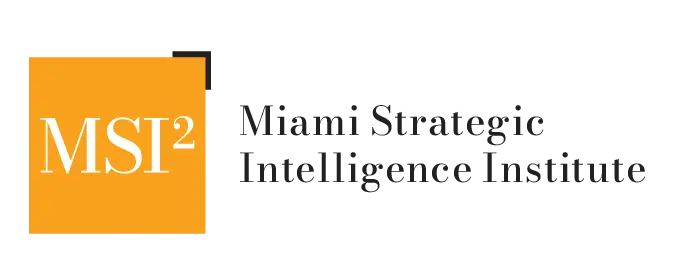22 Mar Will the President of Argentina Be Investigated for the Cryptocurrency Case? A Strategic Analysis
By,
William Acosta, SME, MSI2
Jesús Daniel Romero, Senior Fellow, MSI2
The judicial situation of Argentine President Javier Milei has intensified following accusations related to the cryptocurrency $Libra. The allegations include fraud, influence peddling, and conflicts of interest, all associated with the promotion of the $Libra token, which quickly collapsed, causing significant losses to thousands of investors. This scandal not only jeopardizes Milei’s administration but also raises serious questions about ethics in politics and the regulation of the emerging cryptocurrency market.
Formal Charges
Formal charges have been presented by federal prosecutor Eduardo Taiano, who has indicated possible crimes of abuse of authority, fraud, and others related to the promotion of the token. A key date was January 14, when Argentine President Javier Milei posted on his X account, generating a dramatic increase in the token’s value, which reached nearly $5 before plummeting to near-zero values.
Involved Parties
Javier Milei, as president, is accused of having used his influence to promote $Libra, leading many investors to lose money. Hayden Mark Davis, creator of $Libra and representative of Kelsier Ventures, is implicated in the promotion and development of the token. Julián Peh, CEO of Kip Protocol, the company that developed the technological infrastructure behind $Libra, is also mentioned. Mauricio Novelli and Manuel Terrones Godoy, promoters of the Tech Forum event where the connection between Milei, Davis, and Peh was established, are other key actors. Sergio Morales, an advisor on virtual assets in the National Securities Commission, is linked to the other involved parties.
Accusations and Complaints
The accusations include organized crime, fraud, influence peddling, bribery, failure to fulfill public duties, and violations of the Public Ethics Law. The $Libra scheme is described as a “rug pull,” where a few knowledgeable individuals purchased the token before its mass promotion, benefiting before its value collapsed.

Modus Operandi
The modus operandi in the case of the cryptocurrency $Libra can be described as follows:
Mass Promotion: Javier Milei, using his influence as president of Argentina, made a promotion on his X account on January 14. His message generated an immediate increase in interest and value of the token, which went from cents to nearly $5 in a matter of minutes.
Rug Pull: After the promotion, early holders of the token, who were already familiar with the project, sold their positions before the value collapsed. This phenomenon, known as a “rug pull,” implies that developers or early investors withdraw their funds, leaving new investors with significant losses.
Lack of Regulation: The cryptocurrency was neither registered nor supervised by the National Securities Commission (CNV) of Argentina, leaving investors without necessary protection and generating distrust in the project.
Concentrated Ownership Structure: It is mentioned that $Libra was launched with five virtual wallets controlling 85% of the tokens in circulation, suggesting that most tokens were in the hands of a few, facilitating the collapse of its value.
Involved Companies
Kip Protocol: A technology infrastructure company founded by Julián Peh, mentioned as the developer of the $Libra token. Kip Protocol was responsible for the platform through which the token was launched.
Kelsier Ventures: Represented by Hayden Mark Davis, who is the creator of $Libra. The company is implicated in the promotion and development of the token.
vivalalibertadproject.com: The website related to the $Libra project, which was used for the token’s promotion.
Tech Forum: An event where connections between Milei, Hayden Mark Davis, and Julián Peh were established, suggesting a nexus between them in the token’s promotion.
National Securities Commission (CNV): Although not a company involved in the development of the token, its lack of regulation over $Libra is a critical point in the complaints, as the legality of the promotion and operation of the token is questioned.
Ongoing Legal Actions
The situation has led to ongoing legal actions, including lawsuits in the United States, where the Burwick law firm seeks to represent affected parties in a possible class action. Additionally, the Moyano and Associates law firm has filed a report of criminal operations with the FBI and the Department of Justice. The Specialized Cybercrime Unit (UFECI) has been involved to preserve and recover evidence related to the case, and reports from public and private organizations have been requested.
Additional Complaints
Several complaints have been filed in Argentina, including one from economist Claudio Lozano and members of the Observatory of the Right to the City, as well as from other politicians like Agustín Rombolá and Victoria Donda. Requests have been made for the seizure of funds mentioned by Hayden Davis and the inclusion of Karina Milei as an accused based on alleged conversations about payments.
Reactions and Strategies
In Milei’s circle, it is asserted that there are no crimes to be attributed to him and that they are confident the case will not advance. Judge María Servini has begun reviewing the complaints and summoning the complainants to confirm their accusations.
Procedural Status of Javier Milei
Milei is not charged. According to the Argentine criminal procedure code, when a prosecutor receives a complaint, they have two basic options: the first is to dismiss it for considering that the arguments do not warrant a judicial investigation or because the reported facts do not constitute crimes defined in the Argentine penal code. The second alternative is to take the complaint, analyze the reported facts, and establish what is called the procedural object. That is, which specific crimes will be investigated. It is important to remember that in criminal complaints, facts are investigated, not individuals. Therefore, the definition of the procedural object does not convert the accused into a charged individual. The charge can only be made once the evidence requested and received by the prosecutor turns the accused into a suspect of having participated in any of the crimes mentioned in the procedural object. It must be conducted by clearly identifying the individuals involved, with precise legal justification for why they are charged. So far, there is no such justification in the file that prosecutor Eduardo Taiano is handling. Therefore, the procedural status of President Javier Milei at this moment is only that of a reported individual.
Disinformation Regarding Milei’s Charges
The disinformation operation regarding Javier Milei’s procedural situation in the criminal case known as “Cryptogate” continues. Juan Grabois posted on his X account about the case: “He who does it pays, charges for the crypto thief Milei for the crimes of fraud, influence peddling, and incompatible negotiations with public function.”
We have already explained here that once a criminal complaint is received, the prosecutor must classify the facts to be investigated according to what is provided in the procedural code and the procedural technique. That is precisely what Eduardo Taiano has done.
Many people, unfamiliar with these issues, may be led to believe that the inclusion of a person in a complaint, Milei in this case, directly converts them into a charged individual by determining the procedural object, which is what Taiano has done so far. False. The charge must be made by name and with a clear justification. None of this exists in the file. Therefore, we insist that Milei’s legal status is, thus far, that of a reported individual.
Additionally, another individual mentioned (who, following the reasoning of those who want to see Milei charged, should also be charged) is businessman Hayden Mark Davis, who has expressed his intention to be a plaintiff in the case, meaning he is a third-party affected. Can he do this if, as those operating against Milei claim, he were charged? Absolutely NOT.
So far, his status is identical to that of Milei: reported. Knowing that they are lying, they operate to confuse public opinion, underestimating their readers and followers to gain political and personal advantage. “Lie, lie, and something will stick.” Who said that? Historians still do not agree, although most attribute the phrase to Adolf Hitler’s propaganda chief, Joseph Goebbels. The disinformation campaign by the serial accusers of Milei is a clear practical application of that perverse principle.
Chronology of “Cryptogate”
February 14, 2025
Milei promotes $LIBRA: President Javier Milei recommends the cryptocurrency $LIBRA on X, claiming it is designed to finance Argentine companies.
Peak and collapse: In two hours, $LIBRA reaches its maximum value before collapsing 89% in just four hours, affecting more than 44,000 investors.
February 15, 2025
Milei disassociates: The president deletes his post and claims to have no connection with $LIBRA, deciding not to continue promoting the cryptocurrency.
Disassociation from KIP Protocol: KIP Protocol separates from the project and blames Kelsier Ventures and Hayden Davis for the launch.
Davis confirms his role: Hayden Davis admits to being an advisor to Milei and being behind the launch of $LIBRA.
February 16, 2025
Impeachment: Lawmakers request impeachment against Milei for his possible involvement in “defrauding” related to $LIBRA.
Complaints in court: Multiple complaints are filed in Federal Court.
Link with Novelli: The close relationship between Milei and Mauricio Novelli, a trader linked to the case, is revealed.
February 17, 2025
Defensive interview: Milei defends himself in an interview with Jonatan Viale, where his advisor Santiago Caputo intervenes to mitigate legal issues.
February 18, 2025
Bribery revelations: CoinDesk publishes chats where Davis mentions he could “control” Milei and his surroundings through bribes.
February 19, 2025
Civil lawsuit in the U.S.: Burwick Law initiates a civil lawsuit in the United States on behalf of more than 200 clients affected by $LIBRA.
February 20, 2025
Blocking in Congress: The creation of an investigative committee in the Senate regarding “Cryptogate” is blocked, with a change of stance from six radical senators. The rejection was by only one vote, and it is most suggestive that the senator who cast it had previously expressed support for investigating Milei in the constitutional affairs committee of the National Congress.
Context and Consequences
The case has unleashed a major political scandal, with increasing complaints and intense debate in Congress. The situation is complicated by revelations about prior meetings between Milei and the parties responsible for the project, leading to questions about the president’s transparency and ethics in promoting a cryptocurrency that resulted in harm to thousands of investors.
Conclusion
The $Libra case is characterized by massive promotion that exploited Javier Milei’s political influence, combined with a concentrated ownership structure that facilitated the collapse of the token’s value. The companies involved, such as Kip Protocol and Kelsier Ventures, play a crucial role in the ongoing investigation in both Argentina and the United States. The resolution of this case could set an important precedent for the regulation of cryptocurrencies and ethical conduct in Argentine politics.
References
• Bloomberg. (2025). The rise and fall of $Libra: How a cryptocurrency promoted by Milei collapsed in 24 hours. https://www.bloomberg.com/libra-argentina
• CoinDesk. (2025). Leaked conversations reveal internal discussions on $Libra and its “rug pull” scheme. https://www.coindesk.com/libra-milei-scandal
• El País. (2025a). Argentina’s judiciary begins investigating Milei over the $Libra crypto scandal. https://elpais.com/argentina/2025-02-22/la-justicia-argentina-comienza-a-investigar-a-milei-por-el-escandalo-cripto-de-libra.html
• El País. (2025b). First class-action lawsuit filed in the U.S. over $Libra, the cryptocurrency promoted by Milei. https://elpais.com/argentina/2025-03-18/presentada-en-estados-unidos-la-primera-demanda-colectiva-por-libra-la-cripto-promocionada-por-milei.html • Reuters. (2025). Milei and the $Libra cryptocurrency: A possible case of fraud and influence peddling in Argentina. https://www.reuters.com/milei-libra-investigation
